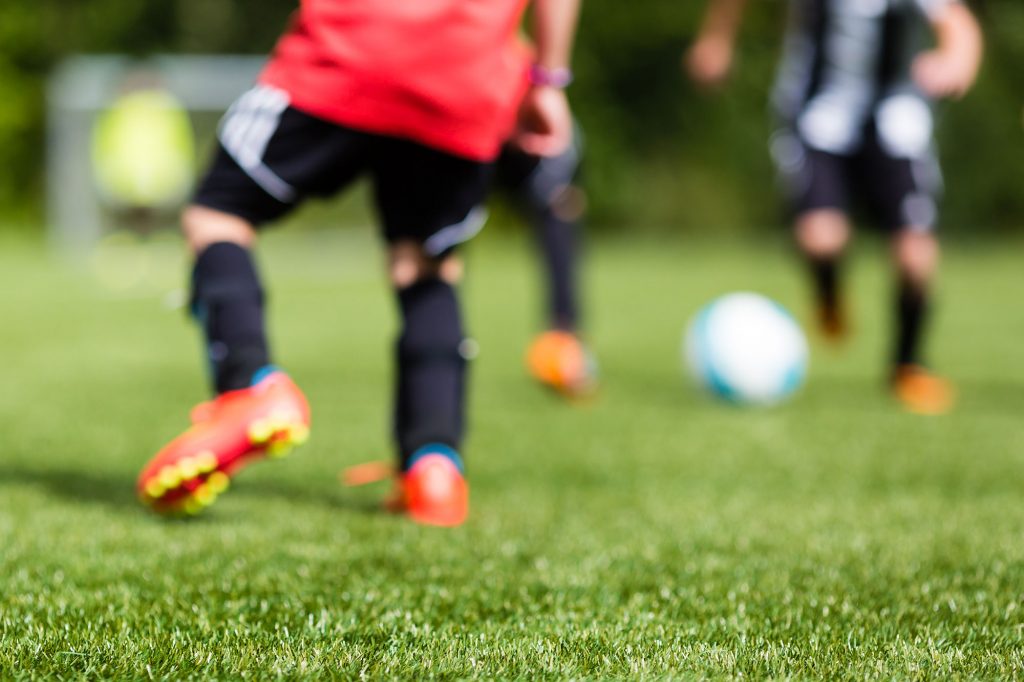It can happen to anyone, from professionals to student athletes to adults on a recreational sports team. You take a ball to the face, an elbow to the lip, or you fall incorrectly. When you sit up, something tastes funny or feels off. That’s when you realize you’ve broken a tooth.
Losing a permanent tooth can be a large scale expense and can cause permanent damage to the mouth. Every year, five million adults and children have teeth knocked out. This is largely due to blunt force hits to the mouth or face.
A large number of accidents in which teeth are lost can be prevented, however. Aside from being mindful of chips and breaks that occur through accidents, minding your mouth in sports can make a big difference in protecting your mouth. By using a properly fitted mouth guard in sports, for instance, anyone can reduce the risk of an accidental hit to the face costing a tooth.
How Does a Mouth Guard Protect Your Teeth?
Mouth guards are inexpensive plastic covers that typically fit over your top teeth. They protect your gums, lips, teeth, and tongue from blows that would otherwise potentially split a lip, cut a gum, or cause a tooth to fall out. Mouth guards for the bottom row of teeth also exist, and if you have braces or other particular needs that make fitting a mouthguard difficult for you, you can have a custom one created by your dentist or orthodontist.
A well-fitted mouth guard should not wiggle, but should also be comfortable, easy to clean, and not difficult to speak or breathe with. Preformed mouth guards are popular, however they do not provide the same benefits as bite-and-boil mouth guards, which you can buy at sporting goods stores, or mouth guards custom formed by your dentist.
What Are the Risks Involved in Losing Teeth?
Not only does knocking out a tooth hurt, it also can be extremely detrimental to your orthodontic care and your finances. When you knock out a tooth, your mouth begins to restructure. If you or your child is receiving orthodontic care, this tooth loss will change the way that that care proceeds, or even change the results of previous orthodontic treatments.
Not only could the effects of your orthodontic care change, the pricing of your dental care overall could change drastically. The costs of treating one lost permanent tooth range from $5,000 to $20,000 over a lifetime. That’s a major financial change that can compound any corrective orthodontic care you or your child have already experienced. Restorations for lost teeth have to have routine maintenance, so an extraction or replacement tooth aren’t simple, one time payments.
Do Only Contact Sports Require Mouth Guards?
It’s a popular misconception that contact sports such as football or hockey are the only ones whose players should use mouth guards on the field. However, that is simply not the case. It’s easy to underestimate the force that can be behind an elbow, knee, or even ball. Basketball is actually the sport whose players would benefit the most from requiring mouth guards. According to Shock Doctor, a major manufacturer of mouth guards, one in four injuries in basketball happen above the neck.
Gymnastics is another front runner for sports that should use more mouth guards. Making contact with a stationary object such as a bar or a gym’s horse could easily take out a tooth. If you or your child engage in any sport where the potential to hit something with force exists, considering a mouth guard is a wise step toward saving money, pain, and grief.
Misconceptions about the severity of the effects of tooth loss, and even about which sports can cause this type of dental trauma, may cause organizations to not immediately require mouth guards. By staying informed and taking an active approach by using mouth guards, you’re not just playing it safe, you’re taking initiative.
“But It’s Difficult to Get My Child to Wear a Mouth Guard!”
We get it— children have opinions about their bodies, and don’t like uncomfortable or awkward additions that they feel may interfere with their game. Your child probably takes their sport seriously, and wants to be able to just get to the field or gym. And nobody wants to be the dork on the team with an obviously ill-fitting mouth guard.
However, leaving the choice of whether a child wears a mouth guard or not often does not guarantee that your athlete will protect their teeth. When the American Association of Orthodontists surveyed parents to see if their child regularly wears mouth guards when engaging in sports, the majority say that they had given up. Many even believe that it’s harder to convince their child to wear a mouth guard than it is to get them to eat all of their vegetables.
When the bills and damage caused by knocking out a permanent tooth can be so large, it makes sense that proper care is made necessary. While it may be easier to let a child play a sport without their mouth guard, it’s a safety hazard.
A way to encourage that your child wears and takes care of their mouth guard is to limit the discomfort or awkwardness of its fit. By picking a properly fitted or custom mouth guard, your child will still be able to breathe and speak without inhibition. Mouth guards also can come in muted colors, and can have slim fits. There are different designs, materials, and fits that can make a difference in comfort for your athlete.
Further Questions or Comments?
If you have any further questions about the use of mouth guards and their effects on orthodontic care, please schedule a consultation to talk with one of our certified doctors. Through years of experience in the Philadelphia area, our team is acquainted with all things orthodontics.
Looking for a Diamond+ Invisalign Philadelphia Provider? Contact us to schedule an evaluation for your Invisalign needs. Our team is experienced in multiple types of orthodontic care, and will work with you to give you the smile you want.




